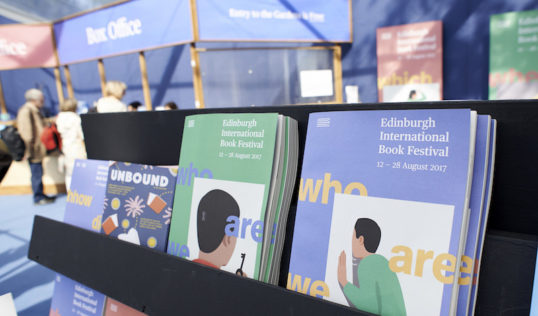Book Festival – the Final Round-up
Charlotte Square gets all theatrical
By Hugh Simpson
The Book Festival once again had much to interest the discerning theatregoer, not only in terms of actual performance but also regarding the thoughts of those responsible for them.
Dirt Road, the third of the Book Festival and Lyceum’s collaborations in the Playing With Books strand, was a huge success. James Kelman’s novel – about artistic creation, family, loss, growing up and so much more besides – is a major work, but one whose complex narrative voice is not necessarily inherently dramatic.
Yet adaptor and director – Lyceum boss David Greig and Wils Wilson – fashioned a performance that, while at times very different from the feel of the book, was true to its inner core.
One thing the novel does exceptionally well is reflect on the power of music. Greig and Wilson have recent form in this regard – think of the NTS’s Prudencia Hart, or their involvement with Karine Polwart’s magnificent Wind Resistance – and they repeated those successes here.
Led by the ever-reliable Aly Macrae, a cast of Moyo Akande, Brian James O’Sullivan and Harry Ward gave gorgeous life to the musical numbers, as well as performing the text impressively. O’Sullivan in particular gave the book’s central character, teenager Murdo, real belief and complexity.
Two important choices were made by Greig and Wilson. One was to share the inner voice of Murdo between the performers to a certain extent; the other was to use the music largely as discrete passages rather than going for a more filmic ‘underscoring’. Both decisions paid off handsomely.
linking narratives,
In contrast to the other two adaptations, there was an attempt made to depict the whole book; if this meant there were some linking narratives, with whole sections and characters jettisoned, it still hung together remarkably well.
Greig was very definite that this was a playful exercise rather than a dry run for a full-blown adaptation. However, while of the three, The Outrun was the one that cried out loudest to be taken further, there was nothing sketchy about this, and no need to make any apologies for a rehearsal process of only three days. The performance stood squarely on its own merits.
Discussions about the creative process are often disappointing, but if you were to choose any novelist and playwright guaranteed to speak with honesty, intelligence and insight it would probably be Kelman and Greig. With Kelman in particular, there is an inescapable feeling that he can only ever scratch the surface regarding the technique and knowledge he possesses.
Such candour does not come naturally to all. The writer Colm Toibin, for example, is open about many things but likes to keep the creative process close to his chest. A polished performer and expert raconteur, he is huge value as an entertainer. However, his contention that his main aim in writing his recent version of the Oresteia story The House of Names was to do as little research as possible, is disingenuous in the extreme considering how clearly he is steeped in the material.
It would have been informative to hear if he has a view on Zinnie Harris’s This Restless House, as he has also – apparently independently – taken the decision to bring Clytemnestra and Electra much more into the foreground.
illuminating discussion
Perhaps this is simply an inevitable and welcome modern day development. It certainly chimed with much of what was discussed by Harriet Walter. Talking about her experiences of playing Brutus, Henry IV and Prospero in Phyllida Lloyd’s all-female Donmar Shakespeare productions, Walter brought all of the intelligence, self-possession and steel she demonstrates on stage to an illuminating discussion.
Despite an obvious love of Shakespeare, there was no fawning Bardolatry from Walter, who expressed the wish that he could come back and ‘do some rewrites’ in view of some of the attitudes expressed in his plays. Her assertion that similar all-female versions of Look Back In Anger or Harold Pinter would simply not work due to their inherent sexism was accompanied by a wish to have new works for women instead.
This was informed by her participation of in an all-female reading of Yasmina Reza’s Art, which she felt came across as much more brutal than any of the male versions. These points about male and female discourse were none the weaker for being made without rancour, by someone who characterises herself as a diplomat rather than a revolutionary.
This was the kind of event that characterises the festival – an entertaining and thoroughly stimulating hour in the company of an artist who has something to say. It was greatly helped by Jackie McGlone’s chairing – that unobtrusive, intelligent helming of events you only notice when it is absent, and one of many things that makes the Book Festival such an annual highlight.
Website: https://www.edbookfest.co.uk
The Edinburgh International Book Festival will run 11-27 August 2018.
ENDS



















